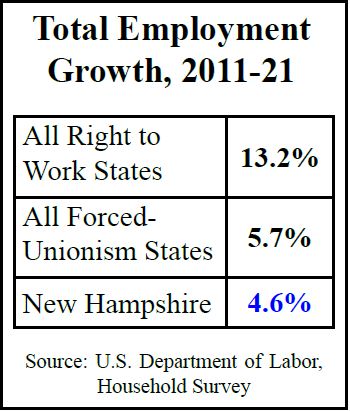
Painfully Slow Job Growth Jeopardizes State’s Demographic Future
As one of just nine states without a personal income tax, and as a state with a long entrepreneurial tradition, New Hampshire might well be expected to have above-average job growth.
But the fact is, as its citizens know all too well, the Granite State has lagged well behind the national average in employment gains for many years.
From 2011 to 2021, the most recent decade for which data are now available, the total number of employed people in New Hampshire grew by just 4.6%.
That amounts to 51% of the national average and just 35% of the average for the 22 states that had Right to Work laws on the books for the entire period in question.
‘People in Their Prime Earning Years Have Long Been Fleeing the State’
“The chronic lack of opportunities for career advancement in New Hampshire is threatening the state’s demographic future,” said National Right to Work Committee Vice President John Kalb.
“U.S. Census Bureau data document how people in their prime earning years have long been fleeing the state.
“They show that, nationwide, the total population of people in their peak-earning years [aged 35-54] fell by 4.2% from 2010 to 2020 as a consequence of aging baby boomers.
“But compulsory-unionism New Hampshire’s 16.8% peak-earning-year population decline, the second highest in the nation, was quadruple the national average.
“Meanwhile in the 22 states that had Right to Work laws on the books the whole time, there was no net decline at all!”
This year, New Hampshire citizens who are fed up with employees’ freedom being trampled and economic growth being stymied by forced union dues and fees as a job condition are banding together to raise the pressure on the state’s elected officials to pass a Right to Work law.
The Manchester, N.H.-based group New England Citizens for Right to Work is leading the charge with its 2022 candidate survey program, which is currently gearing up for the state’s September 13 primary elections and the general elections on November 8.
This program’s goal is to ensure that not a single employee in New Hampshire has to pay tribute to union bosses in order to avoid losing his or her job.
This summer, Granite Staters will be fighting hard to convince their state legislative and executive candidates to support Right to Work.
All 400 House Seats and All 24 Senate Seats Are Potentially up For Grabs
The New England Citizens organization, advised and supported by the National Right to Work Committee, will be contacting politicians of all stripes to urge them to oppose compulsory unionism across the board.
And thousands of New Hampshirites will be flooding state primary candidates with letters, postcards, phone calls, emails, and text messages in support of Right to Work.
The plan is to mobilize an outpouring of support for worker freedom by September 13.
Granite Staters, like other Americans, favor freeing employees with a Right to Work law by an overwhelming margin.
All 400 House seats and all 24 state Senate seats are now potentially up for grabs.
Candidate survey responses will reveal to the voters which candidates for office stand for employee freedom, and which stand with the union bosses.
With a Right to Work Law, New Hampshire Will Finally Live up to Its Motto
Mr. Kalb explained: “Long, bitter experience has shown that when politicians refuse or neglect to answer their surveys, they tend to vote with Big Labor.
“The time to turn up the pressure is now, when they are candidates, rather than when they are safely in office.
“Once New Hampshire joins the 27 states that have already passed Right to Work laws protecting employees from termination for refusal to bankroll a union they don’t want, and in many cases never asked for, the Granite State will finally live up to its famous ‘Live Free or Die’ motto.
“And New Hampshire’s employees and businesses will face much brighter futures when the state’s economy is no longer handicapped by compulsory unionism.”
This article was originally published in the National Right to Work Committee monthly newsletter. Go here to access previous newsletter posts.
To read more on why New Hampshire should pass the Right to Work Law, go here.